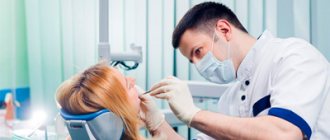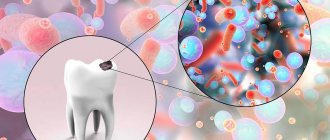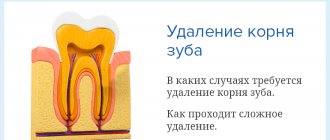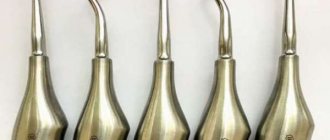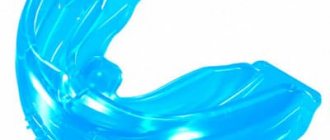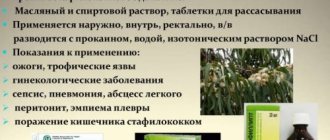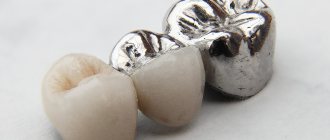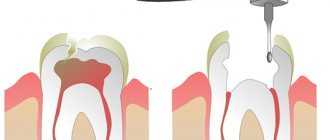Toothache during a cold: causes and treatment
One of the symptoms of a common cold, along with high fever, runny nose and cough, can be toothache. Teeth that are completely healthy at first glance can turn out to be a source of pain and signal problems with the body. When a toothache occurs due to a cold, adequate treatment prescribed by a general practitioner can quickly relieve you of this unpleasant symptom.
Why does toothache occur with a cold?
Toothache, along with headache and earache, can be a symptom of a cold. It occurs most often due to such a phenomenon as the occurrence of excess pressure in the nasal sinuses. When you have a cold, your sinuses become inflamed, and the mucus that forms in them blocks the passage, creating pressure that leads to pain. As soon as the inflammation of the mucous membrane is relieved, the teeth stop hurting. In addition, when we have a cold, we often drink a lot of liquids that contain acid. It can have a harmful effect on tooth enamel and cause pain. Also, when we have a runny nose, the mucous membrane of our mouth dries out quite noticeably, and the sugar that lingers on it in this way can also negatively affect the teeth.
Toothache due to a cold: treatment
So, we have looked at the main reasons why toothache most often occurs during a cold. Treatment prescribed by a therapist will help you recover as quickly as possible, and therefore get rid of painful sensations in your mouth. In the meantime, while the healing process is underway, you can relieve toothache using one of the proven home remedies.
- Rinsing with a baking soda solution (1 small spoon per glass of warm water) will help relieve inflammation and reduce irritation in the mouth. To achieve maximum effect, it is best to rinse your mouth 2-3 times an hour until signs of improvement appear.
- Dental drops. They can be purchased at any pharmacy for a small price. These drops have a calming effect and are based on camphor and valerian. It is enough to apply a few drops on a cotton swab and apply to the aching area.
- Sage decoction. Keep the warm sage decoction in your mouth for a few minutes, and you will notice that your toothache will become much less intense.
- Painkillers. If toothache causes you a lot of problems during a cold, then you can use any of the painkillers: ibuprofen, paracetamol, etc. The main thing is that the benefits of their use outweigh the harm they can cause to your liver and the entire body as a whole.
You can get a consultation at the DENTISTRY clinic. Make an appointment by calling +7 (8342) 308–088 or using the form below.
Make an appointment
Visiting a doctor during a cold – what you need to know
Professionals recommend rescheduling your appointment with the doctor to a later date. During a cold, the body experiences serious stress, and treatment can become additional stress. But if tooth pain prevents you from sleeping, then it is unreasonable to postpone the treatment procedure. What to do? Call the doctor, explain the situation and get detailed recommendations from a professional.
Why do dentists refuse treatment for colds?
- There is a high risk of contracting an infection through wounds in the oral cavity. A body weakened by a cold will not be able to resist viruses, which can lead to a worsening of the patient’s condition.
- The procedure under anesthesia reduces the protective functions of the immune system.
If ARVI is accompanied by constant nasal congestion, inflammation of the sinuses, and throat, there will be no dental treatment. The exception is the presence of acute pain, rapid development of the inflammatory process, and a high risk of flux formation.
Visiting the dentist at a high temperature - threats and risks
If you have a body temperature above 37.2 degrees due to ARVI, you cannot visit a doctor. The body is working to the limit, trying to overcome the infection; additional intervention will aggravate the risk of complications.
An exception is that an increase in temperature is caused by tooth disease, gum inflammation and other problems in the oral cavity. Here you need to contact the dentist as soon as possible. You cannot hesitate to prevent the growth of cysts and other formations.
When is it not recommended to treat teeth for a cold?
If a person has an appointment at the clinic, but fell ill the day before, he should cancel the visit to the doctor in the following cases:
- Treatment of unadvanced caries was planned. If the unit does not hurt, it is quite possible to shift the therapy to 7-10 days. Usually this period is enough to completely recover from ARVI. During the days of treatment for ARVI, maximum attention should be paid to carious cavity care. It is important to clean it of food debris after every meal. In order to slow down the process of destruction of dental tissues, you need to treat them twice a day with a special remineralizing gel. You can buy it at the pharmacy.
- A high temperature is caused by a cold. Fever is a contraindication to any dental intervention.
- A planned removal is required. The period of illness is not at all suitable for such operations. First, the body may react poorly to the anesthetic drug. Then a severe allergy will develop. Secondly, the immune system spends all its energy trying to defeat the virus. This means that the healing processes in the socket area will proceed more slowly, and the risk of wound infection will increase.
- On the eve of visiting the dentist, the patient took acetylsalicylic acid. A week before dental procedures, you should stop using this drug. This is due to the fact that Aspirin strongly thins the blood. This increases the risk of bleeding even with minor medical manipulations.
- The nose became very stuffy, and nasal breathing became impossible. While the doctor is treating the affected molar, canine or incisor, the patient has to breathe through his nose. He simply cannot take a full breath through his mouth. But, if you don’t want to put off visiting the doctor, you can cheat a little - use an effective vasoconstrictor spray ten to fifteen minutes before entering the dentist’s office. True, the drug for rhinitis will still have to be agreed upon with the dentist. After all, it is possible that it will be incompatible with the medications that the dentist will use during treatment.
It is important to understand that the final decision on the advisability of therapy during a cold should be made by the doctor. If a person doubts that a visit to the clinic can be postponed, he should call the dental center and consult with a specialist by phone. This is a fairly common practice.
How might the nerve react?
Often teeth due to deep caries and pulpitis. And such “ache” will very soon turn into more serious, excruciating pain, not only when cleaning and eating hot or cold food, but also in a calm state, both day and night.
With pulpitis, a cavity develops in the coronal part and root canals of the teeth, where the nerve fibers are located, which over time fills with pus and blood. And although the epicenter of inflammation in this case is the nerve, the patient may initially complain that the whole row of teeth is “aching.” The sensations are localized in one tooth a little later, the pain becomes unbearable and requires the intervention of a dentist.
How to help yourself at home
A cold does not mean that you have to wait for recovery and endure toothache. To get rid of unpleasant sensations and minimize the likelihood of complications, you should:
- Do not ignore the requirements for careful hygiene of teeth and gums. Even if you feel unwell, you need to brush your teeth twice a day, and after each meal or sweet drink, rinse your mouth with clean water.
- Take symptomatic medications that are used for ARVI, as they contain painkillers that will help eliminate pain.
Try not to chew hard food on the side of the diseased tooth until you go to the dentist; it is better to switch to soft food for a while.
Clinical researches
Repeated clinical studies have proven that the two-component mouth rinse ASEPTA ACTIVE more effectively combats the causes of inflammation and bleeding compared to single-component rinses - it reduces inflammation by 41% and reduces bleeding gums by 43%.
Sources:
- The effectiveness of the use of Asept “adhesive balm” and Asept “gel with propolis” in the treatment of chronic generalized periodontitis and gingivitis in the acute stage (Municipal Dental Clinic No. 4, Bryansk, Kaminskaya T. M. Head of the therapeutic department Kaminskaya Tatyana Mikhailovna MUZ City Dental Clinic No. 4, Bryansk
- Study of the clinical effectiveness of treatment and prophylactic agents of the Asepta line in the treatment of inflammatory periodontal diseases (A.I. Grudyanov, I.Yu. Aleksandrovskaya, V.Yu. Korzunina) A.I. GRUDYANOV, Doctor of Medical Sciences, Prof., Head of Department I.Yu. ALEXANDROVSKAYA, Ph.D. V.Yu. KORZUNINA, asp. Department of Periodontology, Central Research Institute of Dentistry and Maxillofacial Surgery, Rosmedtekhnologii, Moscow
- The role of anti-inflammatory rinse in the treatment of periodontal diseases (L.Yu. Orekhova, A.A. Leontyev, S.B. Ulitovsky) L.Yu. OREKHOVA, Doctor of Medical Sciences, Prof., Head of Department; A.A. LEONTIEV, dentist; S.B. ULITOVSKY, Doctor of Medical Sciences, Prof. Department of Therapeutic Dentistry of St. Petersburg State Medical University named after. acad. I. P. Pavlova
- Report on the determination/confirmation of the preventive properties of personal oral hygiene products “ASEPTA PLUS” Remineralization doctor-researcher A.A. Leontyev, head Department of Preventive Dentistry, Doctor of Medical Sciences, Professor S.B. Ulitovsky First St. Petersburg State Medical University named after. acad. I.P. Pavlova, Department of Preventive Dentistry
Thinning enamel
Tooth enamel can become thinner for a variety of reasons, such as:
- improper bleaching or poor-quality professional cleaning;
- using brushes that are too hard;
- using pastes with abrasives that expose the enamel to chemical and mechanical stress;
- vitamin deficiency (the pain in this case is characterized by an aching, twitching character and manifests itself during cleaning, rinsing the mouth, eating and drinking).
When treatment is necessary
Among the situations when treatment of an oral disease is urgently needed:
- The ailments appeared a few days after the toothache began or simultaneously with it. This may indicate that a condition mistaken for a cold is, in fact, a sign of the progression of dental pathology. For example, weakness, migraine and high body temperature often indicate the progression of pulpitis, inflammation of a dental root cyst, and damage to soft tissues.
- The pain in the unit is so severe that it cannot be reduced with modern analgesics. Then the person takes one tablet, followed by a second. Then he changes the painkiller to a stronger one, but all attempts made are in vain. Most often, severe discomfort occurs during purulent processes. These are always difficult and dangerous conditions. If they are not diagnosed and treated in time, pus can spread through the bloodstream throughout the body. The consequences of this will be sad - even death.
- Pus is released from the diseased unit, body temperature is constantly elevated and practically does not decrease after using an antipyretic. This symptom complex indicates a serious inflammatory process. It needs to be stopped as soon as possible.
- A jaw injury was sustained. In the first hours after damage to the dental crown, certain measures can be taken to restore it. If you wait, then it will not be possible to restore the integrity of the surface of the unit in a natural way - you will have to carry out prosthetics in the future.
In these situations, the dentist will definitely provide treatment, regardless of the patient’s cold symptoms.
How can discomfort manifest itself?
In the language of dentists, this phenomenon is called hypersensitivity or hyperesthesia. And the main causes of discomfort are abrasion and cracks of the enamel.
Pain from so-called aching teeth can manifest itself in different ways. Some patients have pain in all rows at the same time, and in some patients only 2-3 teeth hurt. The following manifestations are characteristic of hyperesthesia:
- Sharp aching pain of uncertain localization. A person complains that “the whole jaw begins to ache at once.”
- Severe pain when eating sweet/hot/cold foods and drinks.
- Pain localized to a specific part, such as the front teeth or back molars.
Dentists classify enamel hypersensitivity in different ways - according to the degree of prevalence, stage of occurrence and origin.
According to the degree of prevalence, hyperesthesia is divided into two types:
- Localized.
Occurs in the area of one or more teeth. This type of aches is caused by carious cavities and wedge-shaped defects in the necks of teeth. Sensitivity can also be caused by grinding down the enamel to install crowns. - Generalized.
This sensitivity spreads throughout the entire jaw. Hyperesthesia is provoked by periodontal tissue diseases, blooming caries and enamel erosion.
According to the causes of occurrence, hyperesthesia can be classified as follows:
- Hypersensitivity due to dental damage - caries, grinding and erosion of enamel.
- Hypersensitivity due to exposure of necks, tooth roots, as well as systemic pathologies in the body.
They are divided according to the stage of occurrence:
- 1st degree. Teeth ache due to temperature changes; the electrical excitability of dentin does not exceed 8 microamps.
- 2nd degree. Dentin begins to react not only to temperature, but also to chemical stimuli. Maximum electrical excitability is 5 microamps.
- 3rd degree. The teeth begin to cramp under any irritant, electrical excitability increases to 3 microamps.
Features of dental treatment during a cold
If you need to go to the dentist during a cold, you should consider the following:
- ARVI is a disease commonly called a cold that is of viral origin. The presence of any pathogenic microorganisms in the body significantly weakens the immune system. Consequently, any dental treatment may be complicated and the recovery period may take longer.
- Any disease, including a cold, is stressful for the body. Therefore, the response to dental treatment can be unpredictable. For example, the effect of the anesthetic may be weaker, and the pain after tooth extraction or depulpation may spread to the entire face.
- Due to general intoxication of the body, the immune system becomes hypersensitive. She may react to the anesthesia with allergies.
